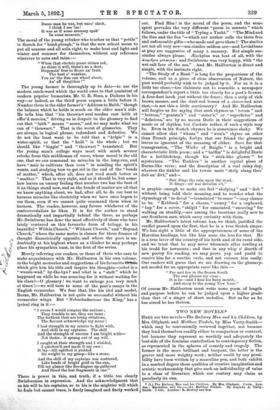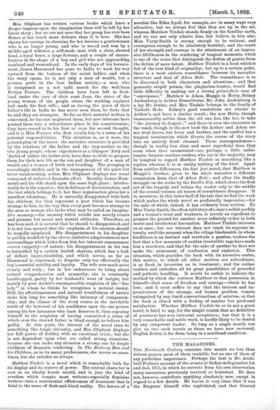TWO NEW NOVELS.*
HERE are two novels—The Railway Man and his Children, by Mrs. Oliphant, and Matthew Tindale, by Miss Varty-Smith- which may be conveniently reviewed together, not because they lend themselves readily either to comparison or contrast, but because they represent so worthily and adequately the best side of the feminine contribution to contefnporary fiction, as represented in the spheres of comedy and tragedy. The former is the more brilliant and buoyant, the latter is the graver and more weighty work ; neither could by any possi- bility have been written by a masculine pen, and both exhibit in a marked degree those qualities of creative imagination and artistic workmanship that give such an individuality of value to a class of literature which our century may claim as peculiarly its own.
* (L) The Ilailicay Man and his Children. By Mrs. Oliphant. 3 vols. Lon. don : Macmillan and Co.—(2.) Matthew Tindais. By Augusta A. Vasty- Smith. 3 vole. London : R. Bentley and Son.
Mrs. Oliphant has written various books which leave a deeper impress upon the imagination than will be left by her latest story ; but we are not sure that her grasp has ever been firmer or her touch more delicate than it is here. She has shown her courage in choosing for her heroine a gentlewoman who is no longer young, and who is wooed and won by a middle-aged widower, a self-made man with a clear, shrewd head, a loyal heart, a large fortune, and a couple of encum- brances in the shape of a boy and girl who are approaching manhood and womanhood. In the early days of his bereave- ment, James Hammond has gone to India to work his way upward from the bottom of the social ladder, and when the story opens, he is not only a man of wealth, but a persona grata in the best Indian society,—a man who is recognised as a not unfit match for the well-born Evelyn Ferrara. The children have been left in Scot- land under the care of their aunt Jean, the sister of the young woman of the people whom the working engineer had made his first wife ; and as during the years of their father's life in India he has never seen them, be feels that he and they are strangers. So far as their material welfare is concerned, he has not neglected them, but new interests have pushed them into a subordinate place in his consciousness ; they have ceased to be his first or even his second thought, and it is Miss Ferrara who first recalls him to a sense of his paternal responsibilities. This situation is, as it were, the ground-plan of the novel : the narrative structure is provided by the relations of the father and the step-mother to the two young people, whose experiences as a Glasgow 'Arry and 'Arriet of rather the better sort, have done so little to prepare them for their new life as the son and daughter of a man of wealth and a woman of birth and breeding. The grouping is exceedingly skilful, and in the management of the quiet but never uninteresting action, Mrs. Oliphant displays her usual command of unforced dramatic effect. Morally. James Ham- mond and his wife stand upon the same high plane ; intellec- tually he is the superior ; but in delicacy of discrimination, and the tact which belongs to it, her finer organisation gives her a manifest advantage. He is naturally disappointed with both his children, for they represent a past which has become strange to him, in the way that every past becomes strange to the man or woman who lacks what may be called an imagina- tive memory,—the memory which recalls not merely events and persons, but moral and mental attitudes. Therefore, as has been said, it is natural that he should be disappointed, and it is not less natural that the emphasis of his emotion should be stupidly misplaced. His disappointment in his daughter is quickly modified by the clever, imitative adaptiveness to new surroundings which hides from him her inherent commonness —even vulgarity—of nature; his disappointment in his son is intensified by a certain loutish shyness, which has a look of defiant impracticability, and which serves, so far as Hammond is concerned, to disguise only too effectually the boy's essential nobility and loyalty. The wife sees much more clearly and truly ; but in her endeavours to bring about mutual comprehension and sympathy, she is constantly handicapped, partly by her husband's want of insight, but mainly by poor Archie's unconquerable suspicion of the "fine lady" in whom he thinks he recognises a natural enemy. Still, his affectionateness and natural trustfulness of nature make him long for something like intimacy of companion- ship ; and the climax of the story comes as the inevitable result of the bestowal of his confidence upon the one person among his few intimates who least deserves it, thus exposing himself to the suspicion of having committed a crime of which even the shrewd father is blind enough to believe him guilty. At this point, the interest of the novel rises to something like tragic intensity, and Mrs. Oliphant displays her full power of dealing with an emotional crisis ; but she is not dependent upon what are called strong situations, because she can make any situation a strong one by simple vividness of dramatic rendering. In The Railway Man and his Children, as in its many predecessors, she moves us some- times, but she satisfies us always.
Matthew Tindale is a novel which is remarkable both for its display and its reserve of power. The central character is cast in an ideally heroic mould, and is just the kind of creation which tempts most writers—especially feminine writers—into a sentimental effusiveness of treatment that is fatal to the sense of flesh-and-blood reality. The heroes of a
novelist like Edna Lyall, for example, are in many ways very attractive, but we always feel that they are up in the air, whereas Matthew Tindale stands firmly on the familiar earth, and we can not only admire him, but believe in him also. Miss Varty-Smith is strong enough to be reticent, and courageous enough to be absolutely truthful; and the result of her strength and courage is the attainment of an impres- sive lifelikeness in the rendering of tragical moments, which is one of the notes that distinguish the fiction of genius from the fiction of mere talent. Matthew Tindale is a book which is full of the best kind of originality; but up to a certain point, there is a most curious resemblance between its narrative structure and that of Adam. Bede. The resemblance is to be discerned in both characters and situations ; and that generally stupid person, the plagiarism-hunter, would find little difficulty in making out a strong prima facie case of " conveyance." Matthew is Adam, Maggie is Hetty, Sidney Aschenburg is Arthur Donnithorne, Mr. John Aschenburg is a lay Mr. Irwine, and Mrs. Tindale belongs to the family of 'Lisbeth Bede. Sidney's good resolutions are similar to Arthur's, and have a similar result ; the new Hetty, though immeasurably nobler than the old one, has, like her, to take " the journey in despair;" and there is even the encounter in the wood, though in the new book the Arthur and Adam are not rival lovers, but lover and brother, and the conflict has a tragical termination which diverts the course of the story into an entirely fresh channel. These correspondences— though in reality less close and more superficial than they seem when thus enumerated—are perhaps a little unfor- tunate, because careless readers, who are in the majority, may be tempted to regard Matthew Tindale as something like a replica, whereas it is in reality nothing of the kind. Apart from subtler differences, the fact just noted, that Matthew is Maggie's brother, gives to the whole narrative a different complexion from that of Adam Bede ; and after the deadly struggle on the rocks by the Devil's Pot, which closes the first act of the tragedy, and brings the reader only to the middle of the second volume, all traces of resemblance disappear. It is, moreover, in this latter half of the tale that we find the work which makes the whole novel so profoundly impressive,—for the sake of which, indeed, it has evidently been written. To Miss Varty-Smith, the often-told story of a man's selfish perfidy and a woman's trust and weakness, is merely an expedient to prepare the ground for another story infinitely richer in both moral and intellectual fascination. Matthew Tindale interests us at once ; but our interest does not reach its supreme in- tensity until the moment when the village blacksmith, in whom kindliness is an instinct and rectitude a passion, realises the fact that a few moments of sudden irresistible rage have made him a murderer, and that for the sake of another he dare not make the atonement of confession and expiation. This situation, which provides the book with its narrative centre, this motive, to which all other motives are subordinate, is as fresh in invention as in treatment ; and the author realises and embodies all its great possibilities of powerful and pathetic handling. It would be unfair to indicate the method by which she restores Matthew to that possession in himself—that sense of freedom and courage—which he has lost ; and it must suffice to say that the interest and im- pressiveness of the strange, sad human problem remain unimpaired by any timid conventionalism of solution, so that the book is closed with a feeling of sombre but profound satisfaction. Whether Matthew Tindale be or be not a great novel, is hard to say, for the simple reason that no definition of greatness has won universal acceptance ; but that it is a very remarkable and noble work, is hardly likely to be denied by any competent reader. So long as a single month can give us two such novels as those we have now reviewed, English fiction is far from being in a moribund condition.



































 Previous page
Previous page